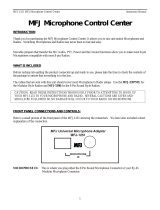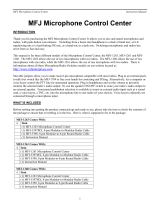Page is loading ...

MFJ-1272B TNC/Microphone Switch
Introduction
Thank you for purchasing the MFJ-1272B TNC/MIC Switch. This switch is
designed to allow simultaneous connection of both your microphone and
your TNC to the radio.
The MFJ-1272B microphone switches were designed to be used with any
radio that has a standard, round, 8-pin microphone connector. Because
many TNCs have different connectors, MFJ offers 5 models:
MFJ Model Number TNC and Multimodes
MFJ-1272B All MFJ TNCs, TAPR TNC II clones, and PK-
12/96/900
MFJ-1272BX PK-232
MFJ-1272BYV KAM® VHF port, KPC-2, KPC-3
MFJ-1272BYH KAM HF port
MFJ-1272BZ PK-88
For circuit board revisions, refer to page 11.
CAUTION
Always check your radio's owner's manual to see if there is a voltage on one
of the pins of the microphone before hooking up the microphone switch.
You could damage your radio by connecting the PTT line to a voltage source.
Do not connect any pin labeled as a voltage source to PTT !
WARNING: MFJ Enterprises, Inc. is not responsible for damaged radios or
associated equipment. It is your responsibility to make sure
your connections will not damage the radio.
KAM is a registered trademark of Kantronics Company, Inc.

MFJ-1272B
Instruction Manual
2
Installation
Before you install the MFJ-1272B TNC/MIC switch, you must set it up for
your particular radio. The MFJ-1272B comes pre-wired from the factory for
Kenwood and Alinco radios
without
RECEIVE AUDIO on the microphone jack.
If you have one of these radios, the TNC/MIC switch is ready to use. If you
have a Kenwood or Alinco radio
with
RECEIVE AUDIO on the microphone
jack, or if your radio is not a Kenwood or Alinco refer to the configuration
section. We have given a few diagrams for placing the internal jumpers for a
few popular radios on Page 7.
Configuration
If you must configure the TNC/MIC switch for your radio, please follow this
procedure.
1. Remove the two screws and top cover of the MFJ-1272B.
2. Look at the writing on the unit's pc board. Please refer to Tables 1 thru
6 as to where to place the jumpers in relation to the pinouts on your
radio.
Consult your radio's manual
and the definitions below to match
signals.
Audio Out:
Audio to the from either the TNC or radio MICROPHONE.
PTT:
This is the Push to talk signal from either the TNC or radio microphone.
Receive:
Audio from the radio to the TNC. Please refer to the External Audio
section on the following page, if you use external audio make no
connection here.
Audio In:
Audio from mic (same # as Audio Out)
Ground:
This is the system ground on radio's mic connector. Some radios have
two ground pins, MICROPHONE GROUND and GROUND. The
microphone ground
should not
be used, due to the possibility of
introducing "hum" into the system
.
Always use the pin labeled ground.
Throughs:
Connect all pins here except MICROPHONE AUDIO.

MFJ-1272B
Instruction Manual
3
(unlabled)
if you use external audio do not connect the radio pins for Receive
3. Header HD3 controls the RECEIVE AUDIO to the EXTERNAL SPEAKER.
Place a push-on jumper on pins 2 and 3 if you want the external
speaker "on" all of the time. Place the jumper on pins 1 and 2 if you
want the external speaker "off" when using the TNC. Most people
prefer not to hear audio during packet.
4. Replace the top and screws.
External Audio
If your radio does not have RECEIVE AUDIO on the microphone, then we
suggest the use of an inter-connecting to supply RECEIVE AUDIO to the
TNC/MIC switch. You would connect a cable from an external speaker or
headphones jack on your radio to the AUDIO IN jack of the TNC/MIC switch.
Therefore, no jumper connection should be made for Receive on the pc
board.
Using the method above for connecting RECEIVE AUDIO to the TNC/MIC
switch, will cut off the internal speaker inside the radio. In this case, you
must connect an external speaker to the EXT. SPEAKER jack on the TNC/MIC
switch. Otherwise, you will not be able to hear
any
signals at all from your
radio.
Jumper Configuration
Because there are so many different radio configurations, we have tried to
make the MFJ-1272B as versatile as possible. With the MFJ-1272B you can
virtually connect any radio pin to just about any TNC pin, just by configuring
the jumpers properly. The following tables will show how to set the jumpers,
depending on the TNC functions versus the MIC pins of a particular radio.
Be sure to follow the tables closely with your radio manual, to verify that you
are not shorting any microphone voltages or any other microphone signals to
GROUND !
Receive Audio Connections
Table 1 shows where you would place a jumper if your radio had RECEIVE
AUDIO on one of the microphone pins. For example, if your radio had
RECEIVE AUDIO on pin 3 on a Kenwood microphone, you would place a
jumper on position, R3A in the RECEIVE section of header HD1. If your radio

MFJ-1272B
Instruction Manual
4
does not have RECEIVE AUDIO on one of the microphone pins, then
do not
place a jumper in the RECEIVE section of header HD1.
Radio MIC Pin MFJ-1272B
Header
Place a jumper on:
1 HD1 RECEIVE--R1A
2 HD1 RECEIVE--R2A
3 HD1 RECIEVE--R3A
4 HD1 RECEIVE--R4A
5 HD1 RECEIVE--R5A
6 HD1 RECEIVE--R6A
7 HD1 RECEIVE--R7A
8 HD1 RECEIVE--R8A
Table 1
*Refer to External Audio, page 3
PTT (Push-to-Talk) Connections
Table 2 shows where you would place a jumper, depending on what
microphone pin is designated PTT. For example, if PTT is designated as
being pin 4 on a Kenwood microphone, then you would place a jumper on
position R4B in the PTT section of header HD1.
Radio MIC Pin MFJ-1272B
Header
Place a jumper on:
1 HD1 PTT--R1B
2 HD1 PTT--R2B
3 HD1 PTT--R3B
4 HD1 PTT--R4B
5 HD1 PTT--R5B
6 HD1 PTT--R6B
7 HD1 PTT--R7B
8 HD1 PTT--R8B
Table 2
Audio Out Connection
Table 3 shows where you would place a jumper, depending on what
microphone pin is designated MICROPHONE AUDIO. The microphone pin,
designated MICROPHONE AUDIO, is the where the transmit audio from the

MFJ-1272B
Instruction Manual
5
TNC comes into the radio. For example, if MICROPHONE AUDIO is
designated pin 1 on a Kenwood microphone, then you would place a jumper
on position R1C in the AUDIO OUT section of header HD1.
Radio MIC Pin MFJ-1272B
Header
Place a jumper on:
1 HD1 AUDIO OUT--R1C
2 HD1 AUDIO OUT--R2C
3 HD1 AUDIO OUT--R3C
4 HD1 AUDIO OUT--R4C
5 HD1 AUDIO OUT--R5C
6 HD1 AUDIO OUT--R6C
7 HD1 AUDIO OUT--R7C
8 HD1 AUDIO OUT--R8C
Table 3
Ground Connections
Table 4 shows where you place a jumper, depending on what microphone
pin is designated GROUND. For example, if GROUND is designated as being
pin 7 on a Kenwood microphone, then you would place a jumper on position
R7D in the GROUND section of header HD2.
Radio MIC Pin MFJ-1272B
Header
Place a jumper on:
1 HD2 GROUND--R1D
2 HD2 GROUND--R2D
3 HD2 GROUND--R3D
4 HD2 GROUND--R4D
5 HD2 GROUND--R5D
6 HD2 GROUND--R6D
7 HD2 GROUND--R7D
8 HD2 GROUND--R8D
Table 4
Most radios have two ground pins on the microphone, GROUND and
MICROPHONE GROUND. Be sure to use the pin designated as ground, not
microphone ground, when making your jumper connections. The use of the
microphone ground could introduce audio hum in the system.

MFJ-1272B
Instruction Manual
6
Through Connections
Table 5 shows where you would place a jumper, depending on the
microphone pin functions that are not to be switched by the MFJ-1272B.
Microphone pins designated, +V, UP and DOWN, are radio functions that are
not needed by the TNC, but are needed for normal microphone operations.
For example, if on a Kenwood microphone pin 3 is designated as being UP,
which would be for increasing your frequency readout on the radio, then you
would place a jumper on position, R3E-M3A on header HD2.
Radio MIC Pin MFJ-1272B
Header
Place a jumper on:
1 HD2 R1E--M1A
2 HD2 R2E--M2A
3 HD2 R3E--M3A
4 HD2 R4E--M4A
5 HD2 R5E--M5A
6 HD2 R6E--M6A
7 HD2 R7E--M7A
8 HD2 R8E--M8A
Table 5
Mic Audio Connections
Table 6 shows where you place a jumper, depending on what microphone
pin is designated MICROPHONE AUDIO. For example, if MICROPHONE AUDIO
is designated as being pin 5 on a Kenwood microphone, then you would
place a jumper on position, M5B in the AUDIO IN section of header HD2.
Radio MIC Pin MFJ-1272B
Header
Place a jumper on:
1 HD2 AUDIO IN--M1B
2 HD2 AUDIO IN--M2B
3 HD2 AUDIO IN--M3B
4 HD2 AUDIO IN--M4B
5 HD2 AUDIO IN--M5B
6 HD2 AUDIO IN--M6B
7 HD2 AUDIO IN--M7B
8 HD2 AUDIO IN--M8B
Table 6

MFJ-1272B
Instruction Manual
7
Jumper positions for specific radios:
KENW OOD 8 PIN MIC
ICOM 8 PIN M IC
KENWOOD TS-680
A
LINCO 8 PIN MIC

MFJ-1272B
Instruction Manual
8
Jumper positions for specific radios:
A
ZDEN PCS-7000 H
STANDARD C5608DA RANGER AR-3500

MFJ-1272B
Instruction Manual
9
Connections
Connection of the MFJ-1272B is very simple.
1. Connect your radio's microphone to the microphone connector on the
front panel of the MFJ-1272B. Be careful not to bend any of the
microphone connector pins. If the microphone plug does not insert
easily, then
do not
force it. Find out what the problem is. Tighten the
threaded portion of the microphone securely.
2. Connect the 8-pin MIC plug which exits the rear of the MFJ-1272B, to
the microphone connector on the radio. Be careful not to bend any of
the microphone connector pins. If the microphone plug does not insert
easily, then
do not
force it. Find out what the problem is. Tighten the
threaded portion of the microphone securely.
3. Connect the TNC cable which exits the rear of the MFJ-1272B, to the
TNC.
External Receive Audio Connection
If you have a radio without RECEIVE AUDIO on the microphone connector,
you will need to perform steps 4 and 5.
4. Connect a cable from the headphones or speaker out jack of the radio
to the AUDIO IN jack of the MFJ-1272B. The AUDIO IN jack on the
TNC/MIC switch requires an RCA male phono plug.
5. Connect a speaker to the EXT. SPKR. jack on the back of the MFJ-
1272B. The EXT. SPKR. jack requires a 3.5mm
mono
plug, with the tip
being positive and the sleeve being ground.

MFJ-1272B
Instruction Manual
10
Technical Assistance
If you have any problem with this unit first check the appropriate section of
this manual. If the manual does not reference your problem or your problem
is not solved by reading the manual you may call
MFJ Technical Service
at
662-323-0549 or the
MFJ Factory
at 662-323-5869. You will be best
helped if you have your unit, manual and all information on your station
handy so you can answer any questions the technicians may ask.
You can also send questions by mail to MFJ Enterprises, INC., 300 Industrial
Park Road, Starkville, MS 39759; by FAX to 662-323-6551; or by email to
[email protected]. Send a complete description of your problem,
an explanation of exactly how you are using your unit, and a complete
description of your station.
Our goal is to provide you, the customer, with the best technical assistance
we can, and to see that it is as accurate as possible.

MFJ-1272B
Instruction Manual
11
Circuit Board Revisions
Note
: This manual is written for the Revision 9 circuit board, pictured on
the right. The only difference between revisions 8 and 9 is the pin
labeling of the connectors HD1 and HD2. If your board is revision 8,
please refer to the labeling of the revision 9 board.

MFJ-1272B
Instruction Manual
12
Schematic
/








